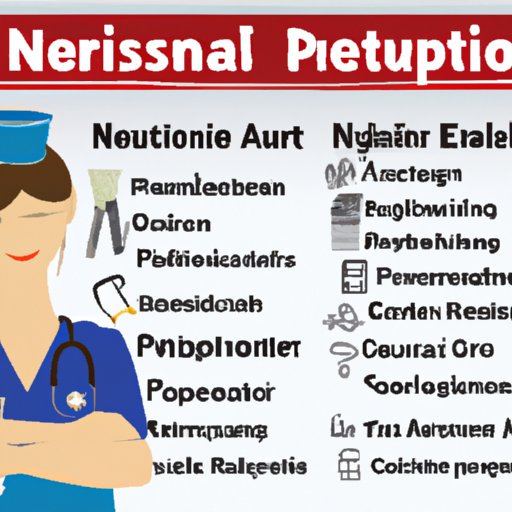Introduction
A nurse practitioner (NP) is a registered nurse who has completed advanced academic and clinical education. NPs are licensed healthcare providers who provide primary, acute, and specialty healthcare services to patients of all ages. They are able to diagnose and treat illnesses, order tests, prescribe medications, and consult with other healthcare professionals.
Nurses play an important role in our healthcare system by providing patient-centered care and helping to reduce health disparities. As such, nurse practitioners have become increasingly important as the demand for healthcare continues to grow. According to the American Association of Nurse Practitioners, there are more than 248,000 NPs in the United States, making them one of the largest groups of healthcare providers.
Educational and Professional Requirements
Becoming a nurse practitioner requires a significant amount of education and training. Most NPs hold a master’s degree in nursing and must be licensed in the state where they practice. In addition, they must pass a national certification exam.
Degree Requirements
The first step in becoming a nurse practitioner is to obtain a bachelor’s degree in nursing (BSN). After completing a BSN program, aspiring NPs can then pursue a master’s degree in nursing (MSN). While some programs may allow students to earn a MSN in three years, most take four or five years to complete. During these programs, students will take classes in advanced nursing theory, pharmacology, healthcare policy, and more.
Licensing and Certification
Once students have completed their MSN program, they must become licensed as a nurse practitioner in the state where they plan to practice. Licensing requirements vary from state to state, but usually include passing the National Council Licensure Examination for Registered Nurses (NCLEX-RN). Once licensed, NPs must also obtain board certification in their specialty area.
Continuing Education
In order to maintain licensure and certification, NPs must complete continuing education courses each year. These courses help NPs stay up-to-date on the latest developments in the field and ensure they are providing high-quality care to their patients.
Roles and Responsibilities
Nurse practitioners serve as primary care providers and are responsible for diagnosing and treating illnesses, ordering tests, prescribing medications, and consulting with other healthcare providers. They may also provide preventive care services, such as immunizations, physicals, and health screenings.
Diagnosing and Treating Illnesses
Nurse practitioners are qualified to diagnose and treat illnesses, both physical and mental. This includes assessing symptoms, ordering diagnostic tests, and developing treatment plans. NPs also provide counseling and education to their patients about their condition and treatment options.
Prescribing Medications
Nurse practitioners are authorized to prescribe medications and treatments to their patients. However, the scope of their prescription authority varies from state to state. In some states, NPs have full prescribing authority and can prescribe any medication without physician oversight. In other states, NPs may only prescribe certain medications or require physician approval before prescribing certain medications.
Ordering Tests
Nurse practitioners are trained to order and interpret diagnostic tests, such as lab tests, X-rays, and ultrasounds. They can use these tests to diagnose illnesses and develop individualized treatment plans for their patients.
Consulting with Other Healthcare Professionals
Nurse practitioners often consult with other healthcare professionals, such as physicians, pharmacists, and social workers. This allows them to provide comprehensive care to their patients and better coordinate care across multiple providers.
Areas of Specialty
Nurse practitioners can specialize in a variety of areas, including primary care, pediatrics, emergency medicine, women’s health, mental health, and geriatrics. Depending on their specialization, NPs may work in hospitals, clinics, private practices, or other healthcare settings.
Primary Care
Primary care NPs provide general medical care to patients of all ages. They diagnose and treat common illnesses, provide preventive care services, and manage chronic conditions.
Pediatrics
Pediatric NPs focus on the care of infants, children, and adolescents. They provide well-child exams, diagnose and treat childhood illnesses, and manage chronic conditions.
Emergency Medicine
Emergency medicine NPs provide care to patients in emergency departments and urgent care centers. They assess and treat life-threatening conditions and injuries, as well as provide follow-up care for discharged patients.
Women’s Health
Women’s health NPs provide care to female patients of all ages. They provide well-woman exams, diagnose and treat gynecologic conditions, and manage pregnancy and postpartum care.
Mental Health
Mental health NPs provide mental health services to individuals, families, and communities. They assess and treat mental health conditions, such as depression and anxiety, as well as provide counseling and psychotherapy.
Geriatrics
Geriatrics NPs specialize in the care of older adults. They assess and treat age-related conditions, provide preventive care services, and manage chronic conditions.
Benefits of Being a Nurse Practitioner
Being a nurse practitioner is a rewarding and challenging career. There are many benefits to being a NP, including financial rewards, career growth opportunities, and the chance to make a difference in patient care.
Financial Rewards
Nurse practitioners are well compensated for their work. According to the Bureau of Labor Statistics, the median salary for NPs was $115,800 in 2019. Salaries vary depending on experience, location, and specialty.
Career Growth Opportunities
Nurse practitioners can pursue a variety of career paths, such as teaching, research, or administration. Many NPs also choose to pursue doctoral degrees and specialize in a particular area of nursing.
Making a Difference in Patient Care
Nurse practitioners are on the front lines of patient care. They have the opportunity to make a real difference in the lives of their patients and the healthcare system as a whole.

Success Stories from Current Nurse Practitioners
For those considering a career as a nurse practitioner, hearing stories from current practitioners can be inspiring. Here are a few success stories from NPs who have made a positive impact in the field.
Personal Accounts of Nurse Practitioners
Karen, a family nurse practitioner, says she chose the profession because “I wanted to make a difference in people’s lives and provide quality healthcare to my community. I found that the nurse practitioner role allowed me to do just that.”
Alice, an adult nurse practitioner, says she loves her job because “I get to help people every day and make a positive impact on their lives. It’s an incredibly rewarding profession.”
Their Journey to Becoming a Nurse Practitioner
Karen and Alice both started out as registered nurses and decided to pursue a master’s degree in nursing to become nurse practitioners. They both had to complete rigorous coursework and pass the necessary licensing and certification exams. After graduating, they both found jobs in their respective fields, and have been working as nurse practitioners ever since.
Challenges They Faced and Overcame
Karen and Alice both faced challenges along the way. Karen struggled with balancing school, work, and family commitments, while Alice faced difficulty navigating the licensing and certification process. However, they both persevered and achieved their goals of becoming nurse practitioners.
Conclusion
Becoming a nurse practitioner requires dedication and hard work, but the rewards are worth it. With the right education and training, NPs can make a meaningful difference in the lives of their patients and the healthcare system as a whole. If you’re interested in pursuing a career as a nurse practitioner, start by researching the educational and professional requirements and exploring the different specialties available.
(Note: Is this article not meeting your expectations? Do you have knowledge or insights to share? Unlock new opportunities and expand your reach by joining our authors team. Click Registration to join us and share your expertise with our readers.)
